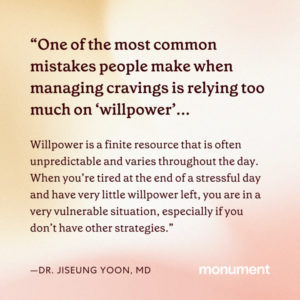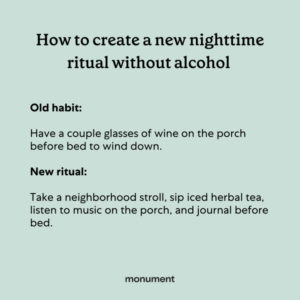When researching all the ways in which someone can get sober, you’ve likely come across the term ‘white knuckling.’ White knuckling describes the process of getting sober using nothing more than the willpower to avoid drinking. While willpower can be a helpful tool for making any major change, it’s important to note that relying on willpower alone is not your only option, and possibly not your best option. Our relationship with alcohol is complex from a biological, social, and psychological perspective, and willpower isn’t always an effective strategy for making a change.
Below I will break down a few misconceptions about “white knuckling” and share effective ways to achieve long-term sobriety. Regardless of what your path looks like, it’s important to note that there’s no ‘right way’ to get sober, and using multiple tools (including medication) doesn’t take away from your achievements.
What is White Knuckling? ‘White Knuckle Sobriety’ Explained
The phrase ‘white knuckling’ comes from the way our knuckles can turn white when we’re gripping onto something extremely tightly. When it comes to sobriety, white knuckling means going through the recovery journey without seeking outside support. While some people find that willpower alone is enough to successfully stop drinking, for others, it may require taking a deeper look into their drinking habits with some external support.
It can be helpful to reflect on our relationship in two key ways:
- Why am I drinking? What underlying feelings and outside influences impact my relationship with alcohol?
- How is alcohol affecting me? How is drinking affecting my mental health, physical health, and social wellbeing?
These questions may appear simple, but the answers are often complex. Seeking external support, often in the form of therapy and peer encouragement, can help you answer these questions, and clarify how to make a change. Working through the root causes of alcohol use can be painful, but it can lead to beautiful healing and transformation. Seeking support on your sobriety journey can make a big difference in that process.
What Does White Knuckling Look Like?
White knuckling can look different for every individual. In general, it means exerting a high level of self-control in order to stay sober. White knuckling can be especially challenging in recovery because of the impact alcohol has on our body and brain. After extended use, our body and brain can come to rely on alcohol for not only pleasure, but for basic functioning, which can lead to what’s known as alcohol dependence. If someone’s dependent on alcohol they likely experience intense alcohol cravings, and are at risk of potentially dangerous alcohol withdrawal symptoms when they stop drinking. These challenges are common in early sobriety, and can be extremely hard to navigate without support. Moreover, it’s always recommended to speak to a physician before cutting back on drinking to avoid the potentially dangerous side effects of withdrawal. That said, some people are able to successfully stop drinking through white knuckling.
Some people think they should be able to quit drinking without help because they demonstrate excellent self-control in other areas of their life. The reality is that no matter how self-disciplined we are, alcohol undermines the circuits of our brain responsible for impulse control. The impulse to drink can take over the higher-level control systems of the brain and make willpower less effective. This is known as the “midbrain flip”, where the midbrain, the more “primitive” part of the brain, can overpower the prefrontal cortex, which is usually responsible for decision making. There is no shame in needing additional support to overcome the chemical influence of alcohol.

Risks of White Knuckling
As Dr. Yoon shares in the quote above, one of the main risks of white knuckling is the possibility of “running out” of willpower in certain moments. While everyone should tap into their self-motivation to make progress, it’s important to be able to fall back on tools and habits in moments when willpower is low. In general, experts recommend engaging in as many tools as possible for the greatest chance of success in sobriety. This is because not every tool works in every situation, and having multiple options can help decrease the risk of a return to drinking. Willpower can be especially difficult to maintain in the face of withdrawal symptoms, alcohol cravings, exhaustion, and when confronted with major life stressors (grief, job loss, etc.). Exploring sobriety tools and finding a recovery community can help decrease the risks associated with white knuckling.
White Knuckling vs. Medically-Assisted Alcohol Recovery
While white knuckling and medically-assisted treatment are two different approaches to recovery, the core elements of each can work together to empower long-term success. Changing your relationship with alcohol requires the will to make a change, which is the basis of white knuckling. At the same time, utilizing additional tools can provide more holistic and reliable support. Three tools that are commonly recommended by experts include medication-assisted treatment (MAT), cognitive behavioral therapy (CBT) and peer support.
Medication-assisted treatment
First, let’s clarify that using medication on a sobriety journey does not take away from your sobriety. As discussed earlier, alcohol can rewire your brain to associate alcohol with pleasure, and even survival, making it incredibly hard to stop drinking. Medications such as naltrexone can interrupt the dopamine reaction that reinforces alcohol, and help reduce alcohol cravings over time. Interested in medication? You can speak to a physician at Monument to see if medication is right for you.
Cognitive behavioral therapy
Many people drink to feel better, including coping with depression, anxiety, trauma, social pressures, and beyond. Without understanding why you’re drinking, it can be especially hard to avoid triggers, and make healthier choices. A therapist specialized in substance use can help you change how you think about alcohol, build new coping mechanisms, and feel better. At Monument, we offer alcohol therapy from the comfort of your own home.
Peer support groups
In addition to expert guidance, peer support can make a world of difference. Connecting with people who get what you’re going through can provide the encouragement you need to stick to your goals when willpower feels low. You can join a support group, call a friend, or seek sober connection in your local community.
These tools don’t only help you change your drinking, but help address all of the influences that contribute to the desire to drink. They can also help improve other areas of your life, such as your mental health and social wellness.

How to Overcome White Knuckling
If you’re feeling drained by white knuckling, you have options. There are many resources available to help you quit drinking, many of which are free or low cost. Local or online recovery groups can be very helpful to build a sense of community and learn from others’ experiences. In online alcohol treatment, you can work with expert clinicians to receive a personalized treatment plan to follow, from the comfort of your own home. Finding fun alcohol-free activities is another effective way to combat white knuckling. The more new things you can try, the better your chances of success at long-term sobriety. Trying a new sport, or a new creative class can have a big impact on your recovery.
If white knuckling is the approach that works best for you at this moment, that’s completely valid too. Leading a joyful, fulfilling life is the ultimate goal of recovery, and there’s no one-size-fits-all approach.
